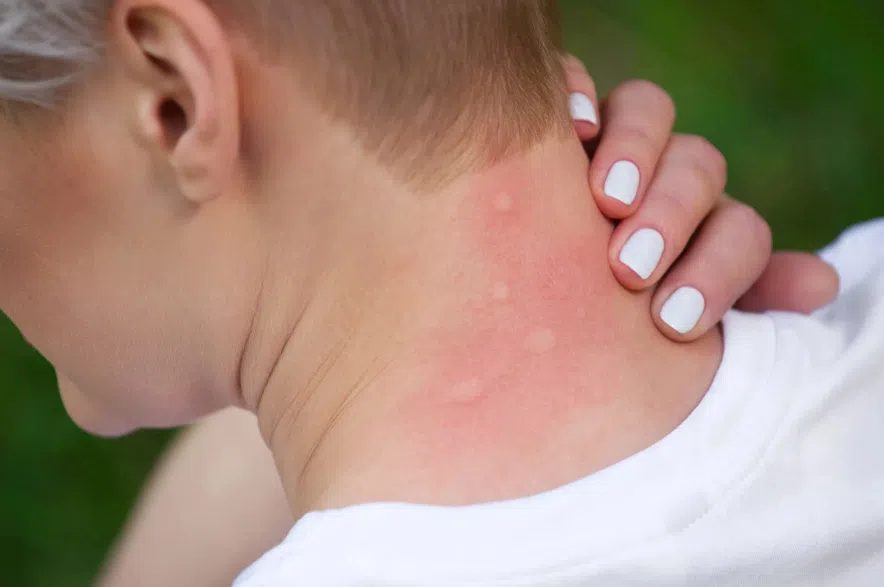The warm weather has awakened mosquitos in parts of Saskatchewan, and this week the City of Saskatoon said it is seeing around 20 more mosquitoes in each of its traps than at this point last year.
So how should people deal with mosquito bites?
Read more:
- How to combat ticks while enjoying the great outdoors in Saskatchewan
- Here’s what to do if you suspect someone has heatstroke
Dr. Carla Holinaty said there are two common reactions a person can have after a bite.
“Some people … won’t react at all and might not even know they’ve been bit,” she said.
“Most people will get the classic mosquito bite — the little red bump that can be really itchy and irritating.”
Holinaty said there is a third reaction connected to an allergy.
“Some people will develop something that’s called skeeter syndrome, which is actually an allergy to that saliva that the mosquito injects into you … they can get really big hot welts, sometimes a little bit of a fever.”
Holinaty said there are also a couple of different ways that you can treat a mosquito bite.
“If it’s just a little bit of a nuisance and irritation that would be when people would often apply After Bite, or the Benadryl dapper,” she said.
“People who are getting more significant reactions, or people who have a ton of mosquito bites, that’s where we might step up into the oral medications, things like antihistamines, where we want to try to turn down the whole system’s reaction.”
Scratching bites is not recommended, however itchy they are.
“Scratching can create breaks in the skin that then become a portal for infection.”
In the southwest part of the province, the West Nile virus has popped up as well.
“We tend to see it every year, I think it’s not a surprise to anybody that it crops up,” Holinaty said.
“It’s always a reminder to healthcare providers that we need to be extra vigilant looking for signs and symptoms.”
Holinaty said that most people can get West Nile virus and not even realize it.
“About 70 to 80 per cent of people would have no symptoms,” she said.
“The people that do have symptoms most are going to have really mild … things like fevers, headaches (and) maybe some body aches.”
Holinaty said that some people can get a really serious infection.
“This is probably less than one per cent of people who are infected with the virus,” she said.
“Those are the things that you hear about in stories about West Nile … neurological symptoms, sometimes really severe headaches, high fevers, stiff neck, nausea, vomiting, problems swallowing.”
Other symptoms can include drowsiness, confusion, loss of consciousness or even seizures.
“It really varies on the person who’s been bit,” she said.
How to stop getting bitten by a mosquito
Using insect repellent is “very effective,” Dr. Isaac Bogoch, an infectious diseases specialist at the University Health Network in Toronto, said.
Both Bogoch and the Public Health Agency of Canada recommend using bug sprays and lotions containing the chemicals DEET or Icaridine. Health Canada says those products should not be used on infants under six months old and parents can use mosquito nets over cribs or strollers when babies are outside instead.
Wearing long sleeves and long pants, socks and a hat can also protect against mosquito bites. People can also wear mosquito nets over their hats. Choose light-coloured clothing, because mosquitoes are attracted to dark colours.
Making sure all open windows have screens to keep mosquitoes and other bugs out is important.
Getting rid of any standing water around your home or cottage also helps, because that’s where mosquitoes lay eggs. Drain buckets, planters, old tires, pool covers, wading pools and
— with files by 650 CKOM’s Will Mandzuk and The Canadian Press
Read more:












